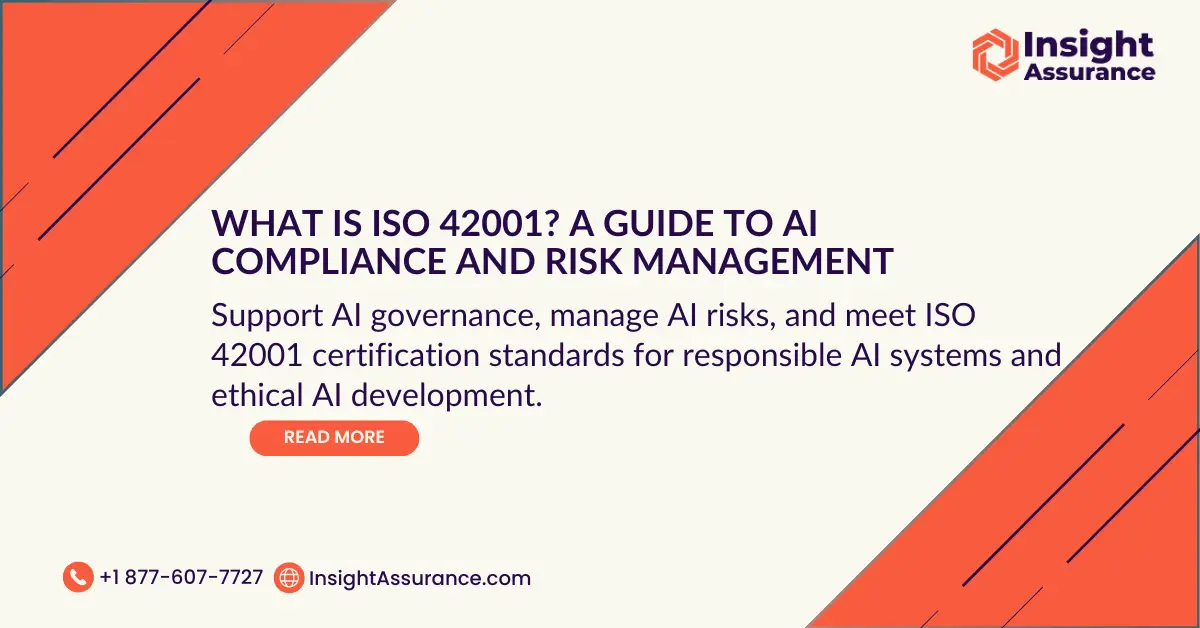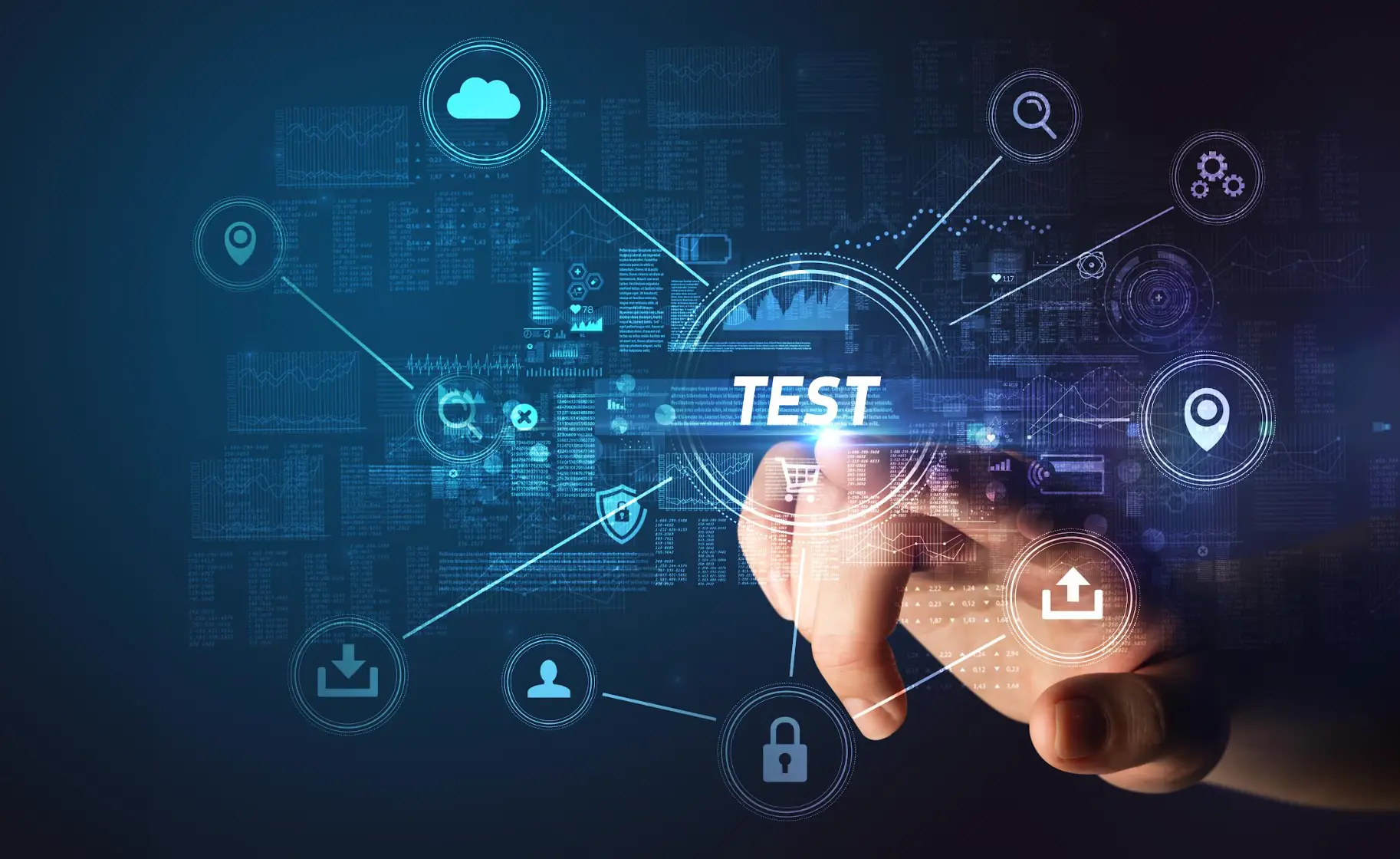Artificial intelligence is evolving rapidly, and so are the risks that come with it. From bias and privacy concerns to a lack of oversight, organizations face increasing pressure to manage AI responsibly. That’s where ISO/IEC 42001 comes in.
Developed by the International Organization for Standardization, and the International Electrotechnical Commission, ISO/IEC 42001 is the first global standard designed specifically for AI management systems. It helps organizations govern AI use with a focus on transparency, risk mitigation, and ethical AI practices — all while aligning with regulations like the EU AI Act.
Whether you’re deploying AI in healthcare, finance, or tech, understanding and adopting ISO/IEC 42001 standards demonstrates that your AI systems are trustworthy, compliant, and future-ready.
What Is ISO/IEC 42001 and Why Was It Developed?
ISO/IEC 42001 is an internationally recognized standard that provides organizations with clear guidelines for structuring, implementing, and maintaining artificial intelligence systems. Think of it as a roadmap for building AI operations that are ethical, transparent, and effective.
But why was ISO/IEC 42001 created in the first place?
The rapid advancement of AI has introduced significant challenges, from algorithmic biases to a lack of accountability in AI decision-making processes. These issues, combined with a global push for responsible AI, created the need for a universal standard. Thus, ISO/IEC 42001 was developed to:
- Address the ethical and operational challenges posed by AI systems.
- Establish a framework for AI governance that aligns with international regulations, such as the EU AI Act.
- Promote global cooperation through shared principles of fairness, accountability, and trustworthiness.
By following ISO/IEC 42001, organizations can meet the growing demand for ethical AI practices, strengthen public trust, and maintain compliance with emerging AI regulations.
The Core Principles of ISO/IEC 42001
ISO/IEC 42001 is built on several core principles that guide organizations in creating and managing AI systems responsibly. Let’s take a closer look:
Risk Management:
One of the most critical aspects of ISO/IEC 42001 is its emphasis on identifying, evaluating, and mitigating risks throughout the AI lifecycle. This includes everything from data security risks to unintended consequences of AI decision-making. Organizations are encouraged to implement robust AI risk assessment processes to address vulnerabilities proactively.
Governance and Oversight:
Governance structures ensure that AI systems are developed and deployed under strict oversight. This involves defining roles, responsibilities, and accountability measures to maintain control over AI operations.
Transparency:
Transparency is crucial for building trust in AI systems. ISO/IEC 42001 encourages organizations to document the design, functionality, and decision-making processes of their AI systems in clear and accessible ways.
Ethical AI Practices:
Ethical considerations are at the heart of ISO/IEC 42001. From promoting fairness in AI algorithms to fostering inclusivity in AI applications, the standard helps organizations prioritize ethical outcomes.
Lifecycle Management:
ISO/IEC 42001 takes a lifecycle approach, covering every stage of AI — from development and testing to deployment and ongoing optimization. This approach helps AI technology remain effective and compliant over time.
The Benefits of ISO/IEC 42001 Certification
ISO/IEC 42001 certification isn’t just about compliance — it’s about unlocking new opportunities and mitigating risks in the fast-evolving world of AI. Here’s what organizations stand to gain:
- Enhanced Credibility: Certification demonstrates your commitment to responsible AI practices, boosting your reputation with stakeholders, customers, and regulators. It showcases your alignment with international standards like ISO/IEC 42001 and global AI governance frameworks.
- Stronger AI Risk Management: By addressing risks proactively, certification helps organizations safeguard against potential vulnerabilities, whether they relate to data security, algorithmic biases, or operational inefficiencies.
- Global Competitiveness: In an increasingly regulated AI landscape, being ISO/IEC 42001-certified can set you apart. It signals your readiness to meet international requirements, giving you a competitive edge in global markets.
- Improved AI Performance: The certification process encourages organizations to refine their AI systems, enhancing performance, efficiency, and reliability.
These benefits make ISO/IEC 42001 certification a strategic asset for any organization looking to thrive in the AI-driven economy.
How Organizations Can Achieve ISO/IEC 42001 Compliance
Achieving ISO/IEC 42001 compliance involves a series of deliberate steps. While the process may seem complex, breaking it down into manageable phases can make it more straightforward.
Here’s how organizations can prepare:
- Conduct a Gap Analysis: Assess your current AI systems and processes to identify areas that meet, partially meet, or fall short of ISO/IEC 42001 requirements. Focus on key areas like risk management, transparency, and governance.
- Develop Comprehensive Documentation: Proper documentation is essential for demonstrating compliance. This includes detailed records of AI system design, risk assessments, and operational controls.
- Prepare for Audits: Audits are a critical component of the certification process. Before an audit, be sure your policies, procedures, and controls align with ISO/IEC 42001 standards.
- Engage Expert Support: Partnering with experienced auditors can streamline the process. Their expertise can help your organization in its journey achieving ISO/IEC 42001 certification.
Empowering Organizations Through ISO/IEC 42001 Certification
ISO/IEC 42001 is more than just a standard — it’s a catalyst for responsible AI development. By adopting this framework, organizations can:
- Build trust by demonstrating transparency, accountability, and ethical governance.
- Reduce risks and improve the performance of their AI systems.
- Align with international regulations and gain a competitive advantage in the global market.
Insight Assurance is here to help. With extensive experience in ISO/IEC certification and AI governance, we provide expert guidance to organizations of all sizes. Whether you’re just starting your journey or preparing for final certification, our experts help make it a simple and efficient process.
Ready to take the next step? Contact Insight Assurance today to learn more about how ISO/IEC 42001 certification can benefit your organization and help you lead in the era of responsible AI.


